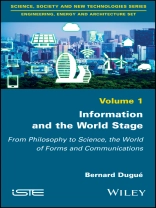Modern science is at a tipping point. A new page in the history of knowledge opens with the ‘information paradigm’, a notion which is gradually supplanting the old mechanistic vision inherited from Galileo and Newton.
This book presents an overview of the place of information and communications in our time, explaining some reasons for focusing on these two notions. All areas of knowledge are concerned: philosophy, social sciences, biology, medicine, as well as physics, the so-called ‘queen of sciences’, from quantum to cosmos.
Quantum dynamics is particularly decisive for thinking about the phenomena of matter while offering a lever to understand the functioning of elementary information in nature. The central scientific thesis of this essay is then developed: physics has two components, concerning ‘communications’ and ‘arrangements’.
This book is intended for scientific scholars as well as those with just a general interest who are anxious to understand the major evolutions that are taking shape in fields of knowledge in the 21st Century.
Tabela de Conteúdo
1. A Presentation of the Paradigm of Information in the 21st Century.
2. Communication Influences the’Mechanisms’ of the Living World and Society.
3. Form, Information and Content.
4. Mass, Charge, Gravity and Rays: Distinguishing Between the Two Kinds of Universal Physics.
5. From Objects to Fields, Reinterpreted Contemporary Physics and the Path Toward Quantum Gravity.
6. Physics in the 21st Century in Relation to Information and Arrangements.
Sobre o autor
Bernard Dugué, École Nationale Supérieure des Mines de Saint-Etienne, France.












